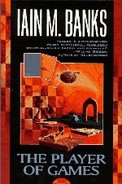
| Publisher: | HarperPrism |
| Copyright: | 1989 |
| Printing: | February 1997 |
| ISBN: | 0-06-105356-2 |
| Format: | Trade paperback |
| Pages: | 295 |
Stepping into one of Iain Banks's Culture novels, of which this is the second, is a curiously different experience from a typical space opera. The Culture universe has an aristocratic feel, a slower pace and a quiet acceptance of all the futuristic machinery that makes it possible, an emphasis on personal concerns and interactions that can be the focus of those who don't need jobs or money in the Culture's panacea. The action in a Culture novel therefore usually takes place on the borders, around the edges, since that's where the conflict is. The center of the Culture feels rather like an extended cocktail party.
Banks, however, writes the best cocktail parties in science fiction. The Player of Games starts with a leisurely introduction to Gurgeh, the best all-around game player in the Culture, and his life, friends, and opinions. The first hundred pages go by with little conflict other than Gurgeh's sense of boredom and inertia and some tension of reputations. It sounds slow and even pointless, but Banks pulls it off. One recognizes early in Gurgeh both characteristics of a brilliant and eccentric chess player and an academic who has gotten so far inside a particular field that he is constantly working to maintain his place and at the same time getting somewhat bored with thinking about the same things. Watching his feelings about his life slowly evolve is surprisingly engrossing.
Gurgeh is eventually recruited out of his protected life into Special Circumstances, that part of Culture's Contact division that deals with tricky problems. They need a game player because they've found a sophisticated interstellar empire whose foundation is an elaborate wargame, a game played by virtually everyone in that civilization and which determines the ranking and hierarchy of the empire's elite. The rest of the book is a beautiful bit of layered game-playing: Gurgeh learning the game of Azad, political games played with the outcome of Azad tournaments, metaphorical battles played out over the game board, games played by the Culture and its intelligent Ships with Gurgeh as a pawn, and games of trust and distrust between Gurgeh and the drone the Culture sent to accompany him. All of this is played out with little physical confrontation apart from a beautiful set-piece finale. Physical action isn't needed to maintain the tension and pace; the psychological tension of the games is more than enough.
This is the best novel about the psychology of game playing that I've read. It isn't a detailed description of any particular games; Banks never bogs down the book with the detail required to recreate Azad in any realistic way. Rather, he captures the feeling of playing the game, the sense of competition and balance, the rough shape of tactics, and the psychological reaction to challenge, winning, losing, and risk. The concept is similar to what Catherine Asaro later did with Quis in The Last Hawk, but Banks weaves Azad into the world with more realism and doesn't abandon the game of it partway through. Game playing can still be used for metaphorical communication, but what it tests best is competition and tactics, and like elections, it serves as an outlet for struggles that would otherwise be settled other ways. There's a limit to how far one can take this sort of system, but Banks also deals with various forms of cheating and random inputs that aren't as random as they might appear. For example, having many of the games played in teams is ingenious from a political standpoint, as it provides a way for inferior game players to still be elevated in the hierarchy within the context of the game.
I haven't mentioned the three-sex biology of the Azad Empire and its interesting implications for the male lead character, or the vilification of the Azad Empire that feels at one point a bit over the top until it becomes clear that this too is a game at another level. The slow start and relaxed matter-of-fact narration supports more resonances and layers than it would seem possible in fewer than 300 pages. Banks neither telegraphs his cleverness nor leaves the reader unclear on what happened; somehow, he finds a balance where the details of the plot seem clear and then, turning it over in one's head, new aspects keep coming to light.
There were times when I had a hard time caring about some of the characters, since Banks's Culture residents have somewhat petty concerns at times, but Gurgeh grew on me as I got into the book. There were also times when the slow and deliberate flow of events felt too laid back, but once I adjusted to it, it fit the story and Gurgeh's nature. Not only does Banks write excellent cocktail parties, he finds a way to make them feel like they matter, without inserting random violence or traditionally dramatic encounters.
An excellent portrayal of the psychology of game playing and a thoughtful story of political intervention. Highly recommended.
Reviewed: 2005-11-18